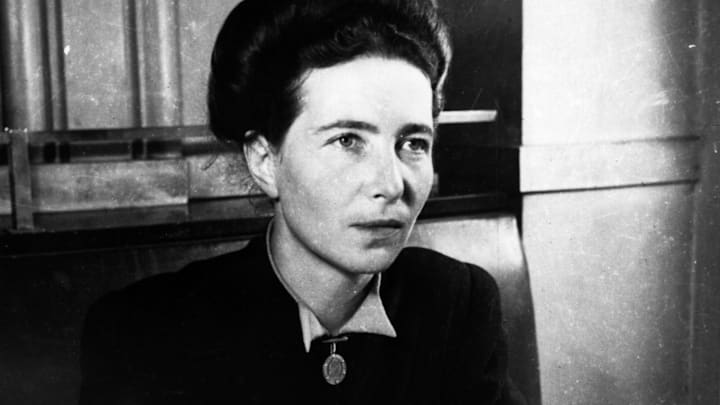Born in Paris in 1908, Simone de Beauvoir was a feminist philosopher, writer, and teacher. She won the Prix Goncourt, France’s prestigious literary award, for her 1954 novel The Mandarins. But her best-known work, The Second Sex, set off a feminist bombshell that continues to shape today’s debates. Here are five fast facts about the thinker.
1. Simone de Beauvoir was deeply religious before embracing atheism.
Both of De Beauvoir’s parents came from bourgeois families. Her father was a legal secretary and an atheist, but her mother was a staunch Catholic and devoted herself to educating her children according to the church’s tenets. Along with her younger sister, Simone studied in a strict Catholic school for girls. Throughout her childhood, she followed religious guidance—and even considered a future as a nun. But when she was 14, Simone abandoned her belief in God and became an atheist.
2. Simone de Beauvoir had a tumultuous teaching career.
Despite her aptitude for academia, De Beauvoir had an ill-fated teaching career. She taught courses in literature and philosophy in Marseilles and Rouen, but her radical ideas about women’s autonomy—and handsiness with female students—got her fired on several occasions. She was let go from a position when the Nazi regime occupied France in 1941, and quit teaching for good when she was accused of seducing a female student in 1943.
3. Simone de Beauvoir had an unconventional relationship with Jean-Paul Sartre.

Simone de Beauvoir met fellow philosopher Jean-Paul Sartre in 1929 when they both took a highly competitive graduate exam in philosophy (Sartre earned the top score, De Beauvoir came in second). De Beauvoir felt she had finally met someone at her level of intellect, with whom she could spar at an elite level. They pursued an egalitarian, open relationship and never hid their affairs from each other. In her 1961 memoir The Prime of Life, De Beauvoir elaborated on their intimacy:
“One single aim fired us, the urge to embrace all experience and to bear witness concerning it. At times this meant that we had to follow diverse paths—though without concealing even the least of our discoveries from one another. When we were together we bent our wills so firmly to the requirements of this common task that even at the moment of parting we still thought as one. That which bound us freed us, and in this freedom we found ourselves bound as closely as possible.”
4. Simone de Beauvoir inspired feminism’s second wave.
De Beauvoir’s The Second Sex, published in 1949, played an important role in influencing the women’s liberation movement in Europe and the United States. Among her arguments, De Beauvoir suggested that there was no “women’s nature” inherently inferior or superior to men’s, and that assigning women a set of roles and attitudes was a form of oppression. She also wrote that women’s liberation must align itself with the struggles of working-class women because both are centered on work as the key to independence. These ideas continue to inform today’s strategies for achieving equality for women.
5. Simone de Beauvoir’s private letters to Violette Leduc sold at auction.
Beauvoir’s intimate, unpublished letters to French writer Violette Leduc, written between 1945 and 1972, were sold at auction for £56,700 in 2020 (nearly $72,800 today). The 297 letters reveal their complex friendship: De Beauvoir served as mentor and sounding board for Leduc, an autobiographical novelist whose work focused on lesbian relationships. In one letter, written after Leduc’s 1955 novel Ravages was deemed obscene by male editors, De Beauvoir reassured her, “I am indignant at their prudery, their lack of courage. Sartre too. Do not be broken. You must defend yourself and we will help you.”
